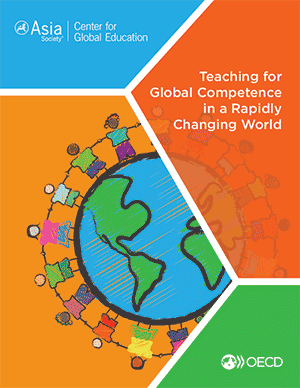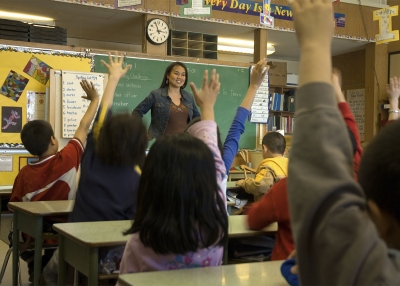OECD, Asia Society Release Framework, Practical Guide for Global Competence Education

LONDON, January 22, 2017 – The Organisation for Economic Co-operation and Development (OECD) and the Center for Global Education at Asia Society today released Teaching for Global Competence in a Rapidly Changing World, a publication that sets forward a new framework for global competence and provides practical guidance and examples of how educators can embed it into their existing curriculum, instruction, and assessment.
OECD and the Center for Global Education worked with academics, educators, and stakeholders in the global education field over several years to define global competence for primary and secondary education.
Both organizations identified four key aspects of global competence. Globally competent youth:
- investigate the world beyond their immediate environment by examining issues of local, global, and cultural significance;
- recognize, understand, and appreciate the perspectives and world views of others;
- communicate ideas with diverse audiences by engaging in open, appropriate, and effective interactions across cultures; and
- take action for collective well-being and sustainable development both locally and globally.
In 2018, OECD will for the first time assess global competence as part of its Programme for International Student Assessment (PISA), the triennial international survey that aims to evaluate education systems worldwide by testing the skills and knowledge of 15-year-old students.
"Education for global competence is a great way to promote divergent thinking, openness and awareness as well as respectful and productive interactions in increasingly diverse societies," said OECD Director of Education and Skills Andreas Schleicher. "As OECD prepares to assess global competence in PISA 2018, this report leads the way in providing educators with practical guidance and examples of how to embed education for global competence in instructional practice, in order to equip new generations with the knowledge and skills needed to live together in a rapidly changing world."
The PISA assessment for global competence will report on how well students are prepared to live and succeed in today’s global economy and multicultural societies. The data that results will help education systems identify what is working and what needs to be implemented more intentionally and systematically to ensure all students develop global competence. The results from the 2018 assessment will be available in late 2019.
"Educators and leaders around the world understand now more than ever that global competence is critical for our future," said Asia Society Vice President of Education Tony Jackson. "Member states of both the United Nations, through its adoption of the Sustainable Development Goals in 2015, and the OECD, through PISA 2018, have demonstrated this by prioritizing education for global citizenship and global competence."
"We live in a time of unprecedented uncertainty and change—but also of opportunity," added Jackson. "Young people of today will be the leaders of tomorrow, and they will need the skills global competence develops to solve the challenges of today and tomorrow—many which we haven’t yet identified."
For more information about the global competence framework and the report, please contact Alexis Menten: [email protected].
About Asia Society
Asia Society is the leading educational organization dedicated to promoting mutual understanding and strengthening partnerships among peoples, leaders, and institutions of Asia and the United States in a global context. Founded in 1956 by John D. Rockefeller 3rd, Asia Society today is a global institution—with offices throughout the United States and Asia—that fulfills its educational mandate through a wide range of cross-disciplinary programming. Across the fields of arts, business, culture, education, and policy, the Society provides insight, generates ideas, and promotes collaboration to address present challenges and create a shared future.
The Center for Global Education at Asia Society partners with education leaders and institutions from the U.S., Asia, and around the world to tackle one of the most critical education challenges today: how to educate all students for employability and citizenship in a global era. Our mission is to develop global competence in students and educators as the foundation for understanding between people in the Asia Pacific region and throughout the world. We accomplish this by working with educators, school districts, parents, and communities to ensure they have the tools and support to globalize learning and prepare young people for our global future.
About the Organisation for Economic Co-operation and Development
The Organisation for Economic Co-Operation and Development (OECD) is a unique forum where governments work together to address the economic, social and environmental challenges of globalization. The OECD is also at the forefront of efforts to understand and to help governments respond to new developments and concerns, such as corporate governance, the information economy and the challenges of an aging population. The Organisation provides a setting where governments can compare policy experiences, seek answers to common problems, identify good practice and work to coordinate domestic and international policies.
The OECD member countries are: Australia, Austria, Belgium, Canada, Chile, the Czech Republic, Denmark, Estonia, Finland, France, Germany, Greece, Hungary, Iceland, Ireland, Israel, Italy, Japan, Korea, Latvia, Luxembourg, Mexico, the Netherlands, New Zealand, Norway, Poland, Portugal, the Slovak Republic, Slovenia, Spain, Sweden, Switzerland, Turkey, the United Kingdom and the United States. The European Union takes part in the work of the OECD.

